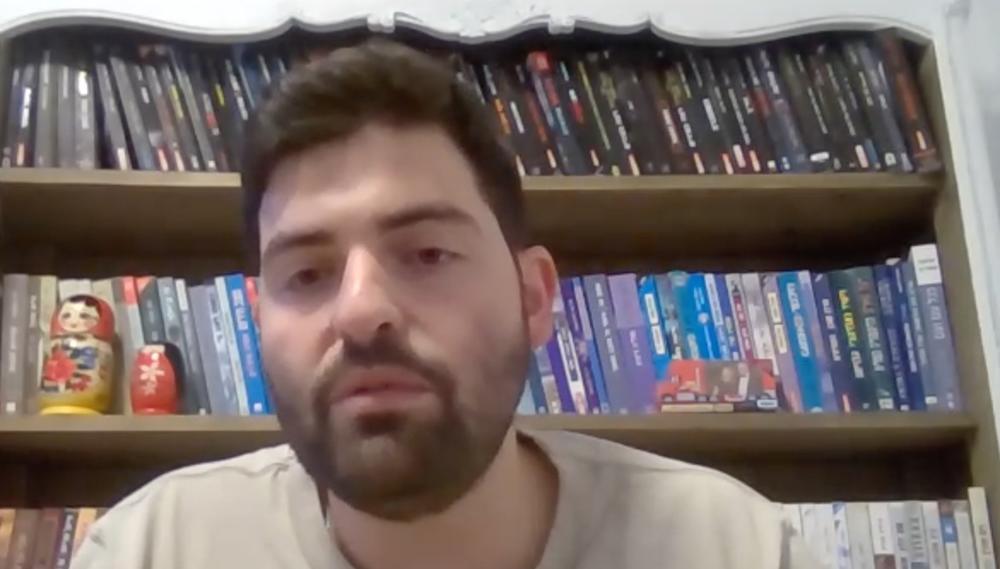
Caption
Former Atlanta resident Gal Bukshpan, who survived the Hamas attack on the Supernova music festival in Israel, speaks to Rough Draft via Zoom on Oct. 12, 2003.
Credit: Screenshot

Former Atlanta resident Gal Bukshpan, who survived the Hamas attack on the Supernova music festival in Israel, speaks to Rough Draft via Zoom on Oct. 12, 2003.
Israel’s Supernova music festival was supposed to be “a journey of unity and love” with well-known DJs spinning music and thousands of young people dancing in the desert at the end of the week-long Sukkot religious holiday.
The party started on Friday night, Oct. 6, at 10 p.m. but attendees didn’t find out exactly where Supernova was being held until a few hours before it began. The location was near Re’im, a kibbutz just three miles from the Gaza border.
Gal Bukshpan — an Israeli citizen and former resident of Atlanta who attended The Epstein School from second to fifth grade — arrived at the music festival with three of his friends just after 5 a.m. on Saturday morning, Oct. 7. The rave was packed with people still dancing at dawn, drinking, talking, and having fun. Until missiles appeared in the sky.
“It was a magical festival, pretty big by Israeli standards,” Bukshpan recalled in an interview this morning with Rough Draft. “It was trance music, everyone was jumping. It’s the kind of festival where you bring your camping gear and there’s a huge outdoor dance floor. Lots of food and well organized, the police were there.”
At 6:25 a.m., Bukshpan and his friends were dancing. Five minutes later, he looked up and saw more than 200 missiles incoming from Gaza.
A combat soldier for three years with the Israel Defense Forces (IDF), Bukshpan said missile attacks are so common that most people decided to wait it out. He smoked a cigarette and talked with his friends. But then there were sounds of explosions and gunfire in the distance.
“People were unsure what was happening and the police didn’t know how to handle it and just told everyone to leave,” Bukshpan said. “The fate of many people was decided in that moment, but we still didn’t know what was coming.”
By then, hundreds of cars were trying to flee from the festival site. There was a column of 400 cars trying to escape, but up ahead on the road, Bukshpan saw cars starting to make u-turns as the alarming sound of bombs and gunfire drew closer.
That’s when he saw hundreds of people running toward his car to escape from the Hamas militants who had driven and paraglided into the festival site as attendees were distracted by the missiles.
Bukshpan and his friends exited their car and ran for more than two miles into the interior of the country.
He was in a group of 250 people and walked in a long line until a pickup truck from a kibbutz took them in groups to a main road that had been bombed and was littered with burning cars and the dead.
“It was a massacre,” Bukshpan said. “It looked like The Walking Dead, a zombie attack.”
Bukshpan and his friends were taken to another kibbutz before they made it back to his home in Tel Aviv.
He later learned that more of his friends who were at the music festival had hidden themselves in the desert sand. His brother-in-law was at the festival and, after being shot in the leg, smeared blood on his face and played dead as Hamas gunmen roamed the area.
An estimated 260 died at the festival site, while other’s fates remain unknown after being kidnapped by the terrorists.
“It’s just horrible,” Bukshpan said. “You hear more and more about babies being beheaded, women raped, whole families slaughtered. My heart is just blown.”
An Israeli citizen, Bukshpan was born in San Francisco and spent three years in Atlanta before returning to Israel. He’s still on active duty with the IDF and just finished a degree in industrial engineering with a focus on renewable energy. He’s anticipating going back to active duty soon.
“I never thought this could happen,” he said. “We have suffered hits, but this is a declaration of war.”
Bukshpan said the attack was an intelligence failure that will have to be dealt with once the war is over.
“This is just the beginning, and we’re not looking at who failed right now. We need to be united, mobilize the army, and there may be three or four fronts we have to fight,” he said, referencing this week’s rocket attacks from both Lebanon and Syria.
“We’re going to win this war. We can’t stop now. It’s going to be a tough one. I hope the people who died will not be in vain. Winning is a tough word because we’ve lost so many people already.”
This story comes to GPB through a reporting partnership with Rough Draft Atlanta.